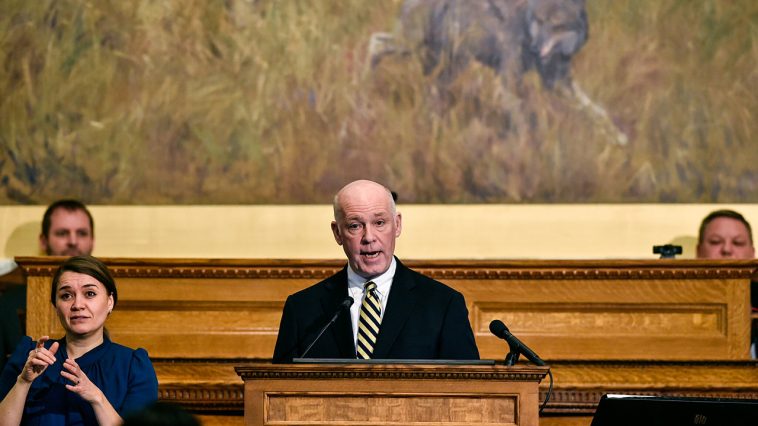LISTEN HERE:
Montana has recently joined other states in implementing bans or restrictions on gender-affirming medical care for transgender youth. This decision came after Republican Governor Greg Gianforte signed the relevant legislation, which transgender lawmaker Zooey Zephyr vehemently opposed, claiming it would result in ‘blood’ on the hands of her fellow lawmakers. Montana is now one of at least 15 states to have enforced such legislation, in spite of objections from the families of transgender children who argue that this medical care is vital.
Montana’s bill has attracted national scrutiny as Republicans penalized Zephyr for her outspoken comments. They considered her words to be personally offensive, which led House Speaker Matt Regier to deny her permission to speak in the House until an apology was issued. However, Zephyr has refused to apologize. Protesting the bill’s signing, Zephyr declared, ‘It is unconscionable to deprive Montanans of the care that we need.’
Zephyr maintains a strong belief in the unconstitutionality of the bill, arguing that it is both cruel and unconstitutional. She anticipates the courts will invalidate the legislation. Addressing transgender youth, Zephyr assured them that victory is in sight and encouraged them to rely on their community for support through these tumultuous times.
Zephyr stood her ground on the House floor earlier this week, her microphone held high while protestors chanted ‘Let her speak.’ These disruptions halted House proceedings for around 30 minutes. Following this, the House banned Zephyr from the area and its gallery, resulting in her voting on bills from a bench in the hallway outside the House.
Lambda Legal, the American Civil Liberties Union (ACLU), and the ACLU of Montana have stated their intention to challenge the ban in court. The ban is scheduled to take effect on October 1, giving Montana youth just five months to seek alternatives to work around the ban or transition off of hormone treatment.
According to the Montana Chapter of the American Academy of Pediatrics, the new bill is ‘an overly broad blanket ban that takes decisions that should be made by families and physicians and puts them in the hands of politicians.’ Governor Gianforte demonstrated his support for the bill on April 17 when he proposed amendments clarifying that public funds could not be used for hormone blockers, cross-sex hormones, or surgical procedures.
Gianforte later wrote in a letter that the bill ‘protects Montana children from permanent, life-altering medical procedures until they are adults, mature enough to make such serious decisions.’ However, Zephyr held her fellow lawmakers accountable for the decisions they made regarding the bill during the following day’s debate on the amendments.
BREAKING: Republican Governor of Montana Greg Gianforte Signs Law Banning Transgender 'Care' for Minors. The bill prohibits transitional hormone treatments and surgeries for transgender people under 18. His son, who is nonbinary, had urged him to reject the bill. But, the… pic.twitter.com/o9Tr5erYZ2
— Simon Ateba (@simonateba) April 29, 2023
House Majority Leader Sue Vinton claimed that Zephyr’s language was ‘entirely inappropriate, disrespectful, and uncalled for.’ The Montana Freedom Caucus intentionally misgendered Zephyr, using male pronouns in a letter proposing that she be censured. Following Zephyr’s protest, the Caucus called for further disciplinary action against the lawmaker.
Under the new law, medical professionals could face a suspension of their medical licenses for at least one year if they provide care banned by the legislation. Furthermore, if a patient experiences any form of harm as a result of a banned procedure, they can sue the healthcare provider up to 25 years following the treatment. Medical malpractice insurance will not cover physicians in these situations.
The legislation also prohibits the involvement of public property and employees in gender-affirming treatment. Throughout the emotionally charged committee hearings, opponents of the bill argued that hormone treatments, and in some cases, surgery, constituted evidence-based care. Organizations such as the American Academy of Pediatrics, numerous medical associations, and countless parents attest to the life-saving potential of these treatments for individuals experiencing gender dysphoria.
Families of transgender children testified that the bill violated their rights as parents to provide medical care for their children. Additionally, opponents underscored the inconsistencies in the restrictions, pointing out that treatments such as puberty-blockers and breast-reduction surgery remain legal for minors not experiencing gender dysphoria, a difference they argue is unconstitutional.
In his letter to legislative leaders, Governor Gianforte acknowledged that he had met with transgender residents and recognized the validity of their struggles. He further stated that Montanans grappling with gender identity issues are deserving of love, compassion, and respect.
Despite these purported sentiments, Zephyr contested Gianforte’s amendments during the House debate, asserting that the transgender community in Montana requires ‘access to the medical care that saves our lives.’
This legislation marks the second time Sen. John H. Muller has attempted to pass a bill outlawing gender-affirming treatment for transgender minors. During the 2021 legislative session, his initial bill to ban surgical and hormone treatments for transgender youth did not pass. A subsequent bill to ban surgical treatments faced the same fate. However, Muller succeeded in passing a bill to ban transgender females from participating in girls’ and women’s sports in 2021. The part of this bill relevant to colleges was later ruled unconstitutional.
Despite Montana’s controversial move, undertones of compassion from Governor Gianforte and the dedication of advocates like Zooey Zephyr signal a continued push for understanding and acceptance of the transgender community. While the legislation seems to be seeking the best interests of Montana’s youth in terms of medical care, it remains to be seen whether or not the ban will hold up in court or lead to unforeseen, harmful consequences.


